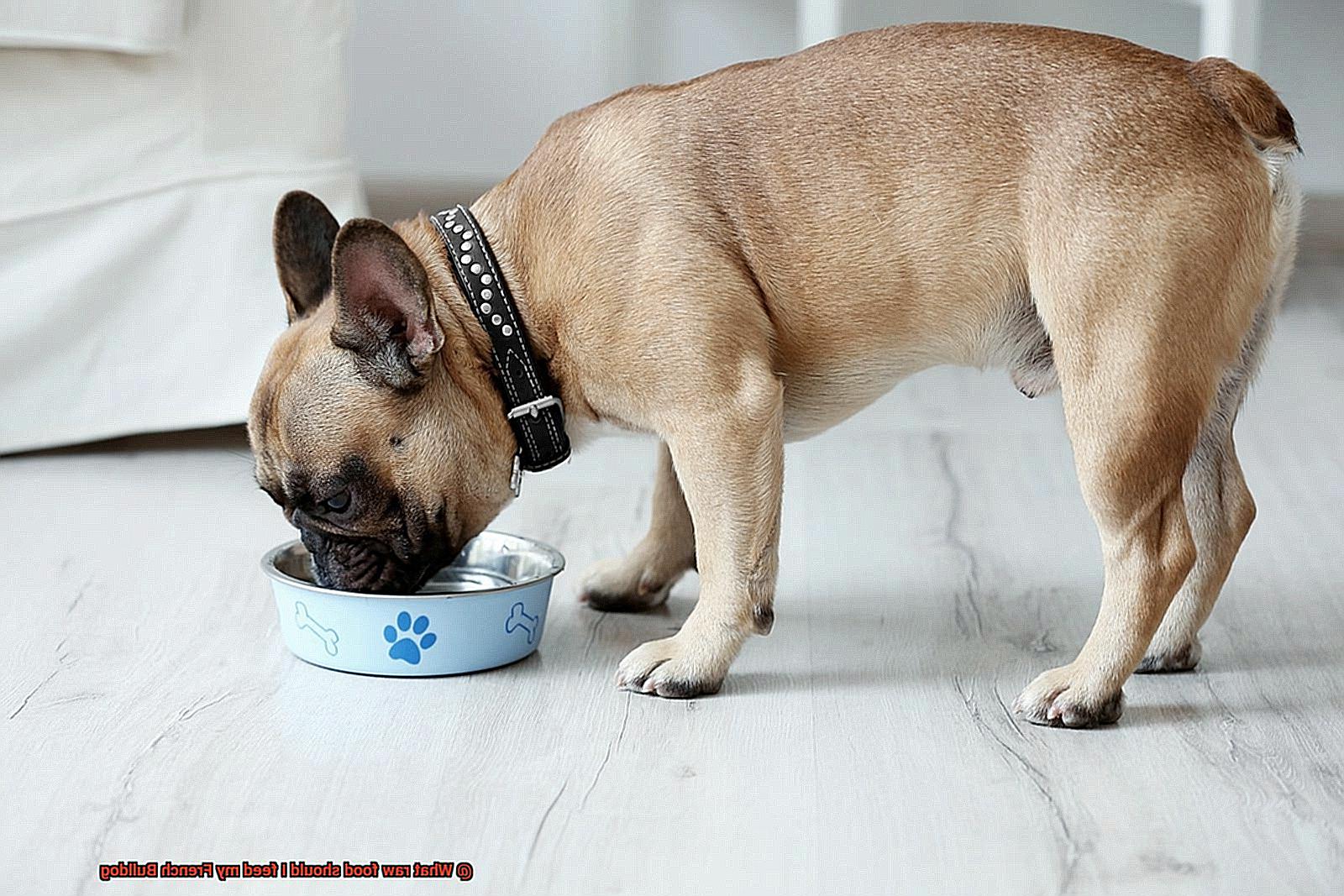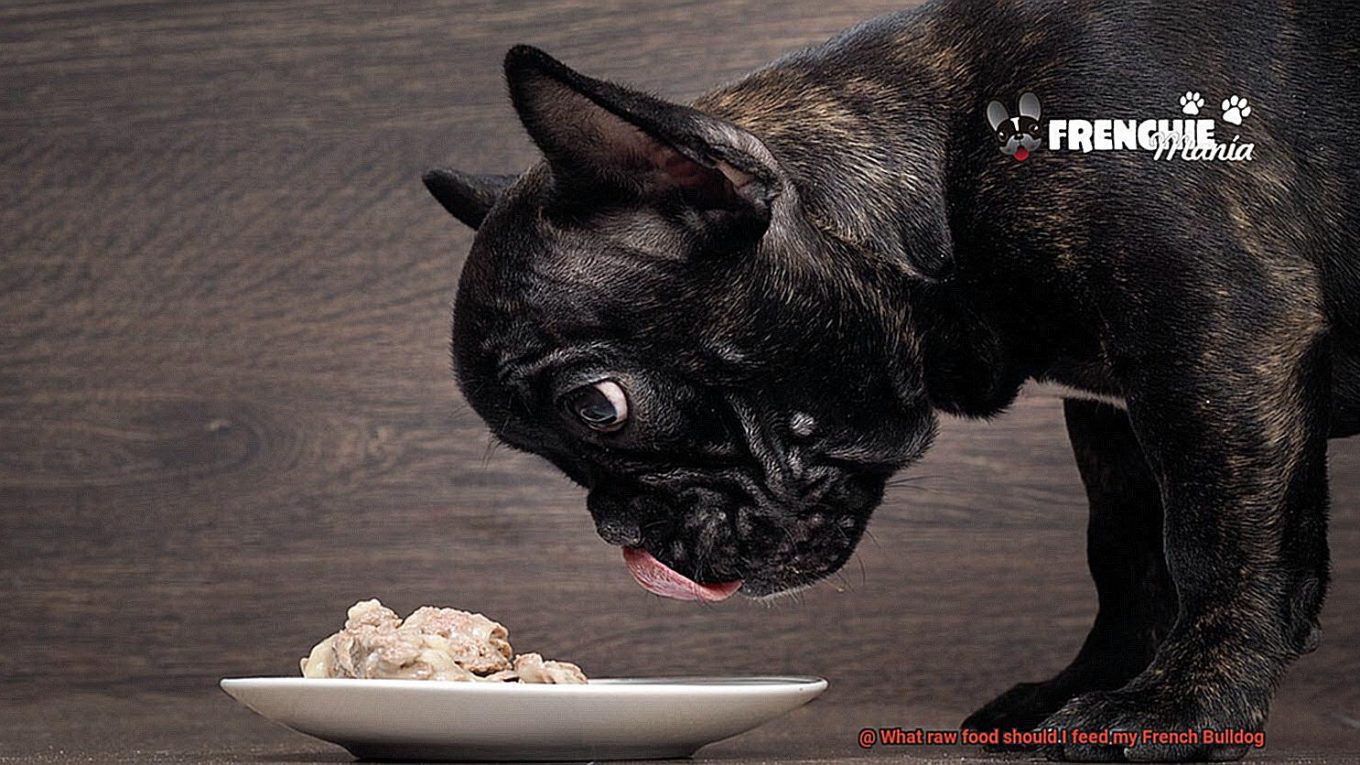What raw food should I feed my French Bulldog?
You know that your furry friend deserves the best when it comes to their diet.
The right food can keep them healthy, energized, and happy. One popular feeding option for French Bulldogs is the raw food diet.
This type of diet includes raw meat, bones, and vegetables. But with so many choices available, it can be overwhelming to decide what to feed your pet.
Are fruits and veggies safe for your French Bulldog? Is chicken a good choice or should you stick to beef?
We’ll explore these questions and more in this article. By the end of this chapter, you’ll have all the information you need to make informed dietary choices for your four-legged friend.
So let’s dive in and learn about the benefits and drawbacks of feeding your French Bulldog raw food, as well as which types of foods are best suited to their nutritional needs.
Benefits of Feeding a Raw Food Diet to French Bulldogs
Contents
- 1 Benefits of Feeding a Raw Food Diet to French Bulldogs
- 2 Protein Sources for French Bulldogs
- 3 Healthy Fats for French Bulldogs
- 4 The Benefits of Including Raw Bones in Your French Bulldog’s Diet
- 5 Precautions when Feeding Bones to Your French Bulldog
- 6 Developing a Balanced and Nutritious Meal Plan for Your French Bulldog
- 7 Conclusion
These diets offer numerous health benefits that can help your French Bulldog maintain optimal health and wellbeing.
One of the most significant advantages of feeding a raw food diet to your French Bulldog is weight control. Raw food diets have fewer carbohydrates than kibble, which can help prevent unnecessary weight gain.

Plus, the high protein content in raw foods supports muscle growth and maintenance, keeping your pup lean and strong. But weight control is just the tip of the iceberg when it comes to the benefits of feeding your French Bulldog a raw food diet.

Raw food is easier to digest than kibble, which means that your pup’s body can absorb more nutrients from their food. This can lead to healthier skin and coat, as well as improved immune function.
In addition, a raw food diet can reduce the risk of certain health problems. Studies have shown that these diets may help prevent dental issues like tartar buildup and gum disease, as well as digestive problems such as diarrhea and constipation.
Raw bones are also a great way to clean your dog’s teeth while providing essential minerals like calcium (just be sure to supervise them while they’re chewing and avoid cooked bones). Of course, it’s essential to work with a veterinarian or canine nutritionist to create a meal plan that meets your French Bulldog’s specific needs.
They can help ensure that your pup is getting all the essential nutrients they need from their raw food diet. In short, feeding your French Bulldog a raw food diet can be an excellent way to support their overall health and wellbeing.
Protein Sources for French Bulldogs
Protein is a building block for French Bulldogs’ muscles, tissues, and organs, making it a crucial nutrient for their overall health and well-being.
When selecting protein sources for your French Bulldog’s raw diet, it’s essential to consider both animal and plant-based proteins. Animal-based proteins are an excellent source of essential amino acids like iron, zinc, and vitamin B12.
Chicken, beef, lamb, turkey, and fish are some of the best animal protein sources for French Bulldogs. These protein sources are packed with nutrients that are necessary for your dog’s overall health.
On the other hand, plant-based proteins can be an excellent alternative for dogs with allergies or sensitivities to animal-based proteins. Lentils, chickpeas, quinoa, and pumpkin seeds are some of the best plant-based protein sources for French Bulldogs.
These plant-based proteins are also high in fiber and antioxidants that can boost your dog’s immune system. However, while plant-based proteins can be a great addition to your French Bulldog’s diet, they should not replace animal-based proteins entirely.
Animal-based proteins are still the most natural and complete source of protein for dogs. To ensure that you’re selecting high-quality protein sources for your French Bulldog’s raw diet, it’s essential to choose reputable sources.
Aim for variety in your dog’s protein sources to ensure they’re getting all the essential amino acids and nutrients they need. In conclusion, choosing the right protein sources is crucial to your French Bulldog’s overall health and well-being.
By including both animal and plant-based proteins in their raw diet and ensuring that you’re selecting high-quality protein sources, you can help your furry friend thrive.
Healthy Fats for French Bulldogs
These fats are crucial for their overall health and well-being because they provide energy, support their immune system, and aid in the absorption of essential vitamins and minerals.
But not all fats are created equal, so it’s essential to choose the right type of fats for your French Bulldog.
Omega-3 Fatty Acids
One of the best sources of healthy fats for them is fish – specifically sardines, salmon, and mackerel. These fish are rich in omega-3 fatty acids that maintain healthy skin and coat, reduce inflammation, and support heart health.
Coconut oil
Another great source of healthy fats for French Bulldogs is coconut oil.
Coconut oil contains medium-chain triglycerides that are easily digestible and provide quick energy. Plus, it may have antibacterial, antiviral, and anti-inflammatory properties that benefit your dog’s overall health.
Avocado
Avocado is another fantastic source of healthy fats suitable for French Bulldogs. It’s packed with monounsaturated fats that can lower bad cholesterol levels while raising good cholesterol levels.
Additionally, avocados contain essential vitamins such as C, E, and K along with potassium and fiber. While healthy fats are beneficial to your French Bulldog’s health, it’s important not to overdo it.
Therefore, it’s always best to consult with your veterinarian before making any significant changes to your furry friend’s diet.
The Benefits of Including Raw Bones in Your French Bulldog’s Diet
Before you start feeding your pup raw bones, it’s important to know both the risks and rewards. One of the most significant benefits of giving your French Bulldog raw bones is that it helps keep their teeth clean and healthy.

Chewing on bones can remove plaque and tartar buildup, which can reduce the risk of dental issues such as gum disease and tooth decay. It also provides mental stimulation for your dog, keeping them entertained and preventing boredom.
In addition to dental benefits, raw bones are an excellent source of essential minerals such as calcium and phosphorus. These nutrients play a vital role in maintaining healthy bones and teeth, which is especially important for growing puppies who need a balanced diet to promote their development.
However, not all bones are safe for your furry friend to enjoy. Raw bones are generally safer than cooked bones because cooking can make them brittle and more likely to splinter, which can be harmful to your pup’s health.
It’s also crucial to choose appropriately sized bones for your French Bulldog to avoid any choking hazards or digestive issues if swallowed whole. When introducing raw bones into your French Bulldog’s diet, it’s essential to do so gradually and under supervision.
Start with small pieces of bone and monitor your puppy’s behavior and digestion closely. If you notice any adverse reactions such as vomiting or diarrhea, discontinue feeding bones and consult with your veterinarian.
In summary, including raw bones in your French Bulldog’s diet can offer many benefits for their dental and overall health. However, it’s important to do so safely and responsibly to protect your pup’s wellbeing.
Precautions when Feeding Bones to Your French Bulldog
Feeding bones can be an excellent way to achieve this, but it’s vital to take precautions to ensure their safety.
The first and foremost precaution is to choose raw bones instead of cooked ones. Cooked bones can easily splinter, causing internal damage or choking hazards in your dog. Raw bones are softer and contain essential amino acids and enzymes that can contribute to your dog’s wellbeing.
Secondly, supervise your French Bulldog while they’re chewing on a bone.
This is particularly important if you have a puppy or a dog that doesn’t chew their food properly.
Keep a watchful eye on them to ensure they’re not attempting to swallow the bone whole.
If you notice any signs of distress, such as coughing, gagging, or vomiting, take the bone away immediately. It’s also crucial to choose the appropriate size and shape of the bone for your French Bulldog’s size and age.
Small dogs like French Bulldogs should only be given small bones that are easy to chew and digest. Avoid large bones that may cause jaw pains or damage their teeth.
Lastly, limit the amount of bone you give to your French Bulldog each week. While bones are an excellent source of nutrients, overfeeding them can lead to constipation, vomiting, or diarrhea.
Too much of a good thing can be harmful, so make sure you don’t overdo it. In conclusion, feeding bones to your French Bulldog can be a healthy and enjoyable activity for both you and your pet.
By choosing the appropriate type and size of bones and supervising your French Bulldog while they’re chewing on them, you can help prevent any potential health problems from arising.
0UckGtm6fcY” >
Developing a Balanced and Nutritious Meal Plan for Your French Bulldog
Think of it as planning the ultimate dinner party for your furry friend – but instead of guests, you want to nourish your pup with all the essential nutrients they need.
While a raw food diet can be an excellent option for your Frenchie, it’s important to remember that not all raw foods are created equal. When developing a balanced meal plan for your French Bulldog, consider their age, weight, activity level, and overall health.
Consulting with your veterinarian or canine nutritionist can also help ensure that you’re meeting all of their nutritional needs. Your French Bulldog’s meal plan should include muscle meat, organ meat, bone, and vegetables.
Muscle meat can be the star of the show and may include beef, chicken, turkey, and lamb. Don’t forget about organ meat like liver and kidneys – they contain essential nutrients that may not be present in muscle meat.
Bones are also crucial as they provide calcium and help clean teeth. Vegetables play an essential role in a balanced raw food diet for your Frenchie.
Nutrient-rich veggies such as kale, spinach, broccoli, and carrots provide vitamins and minerals necessary for your pup’s overall health. But be cautious – some vegetables like onions and garlic can be toxic to dogs and should be avoided.
Also Read: How to Feeding French Bulldog BARF Diet? – Allfrbulldogs.com
Conclusion
In conclusion, a raw food diet is the way to go if you want your French Bulldog to be in top shape.
By providing them with the right combination of protein sources, healthy fats, and raw bones, you can help reduce unnecessary weight gain, improve immune function, and even reduce the risk of dental issues and digestive problems. When it comes to selecting protein sources for your furry friend’s raw diet, both animal and plant-based proteins are essential.
While animal-based proteins are still the most complete and reliable source of protein for dogs, plant-based proteins can be a great alternative for those with allergies or sensitivities. Don’t forget about healthy fats.
Fish oil, coconut oil, and avocado are all fantastic options that can promote immunity, enhance their immune system, and aid in the absorption of essential vitamins and minerals. Raw bones are another crucial component of your Frenchie’s diet plan.
They’re an excellent way to freshen their teeth while also providing essential minerals like calcium. Just make sure to supervise them while they’re chewing and choose raw bones over cooked ones.
To keep your French Bulldog healthy and happy, it’s vital to provide them with a balanced diet plan that includes muscle meat, organ meat, bone, and vegetables.




